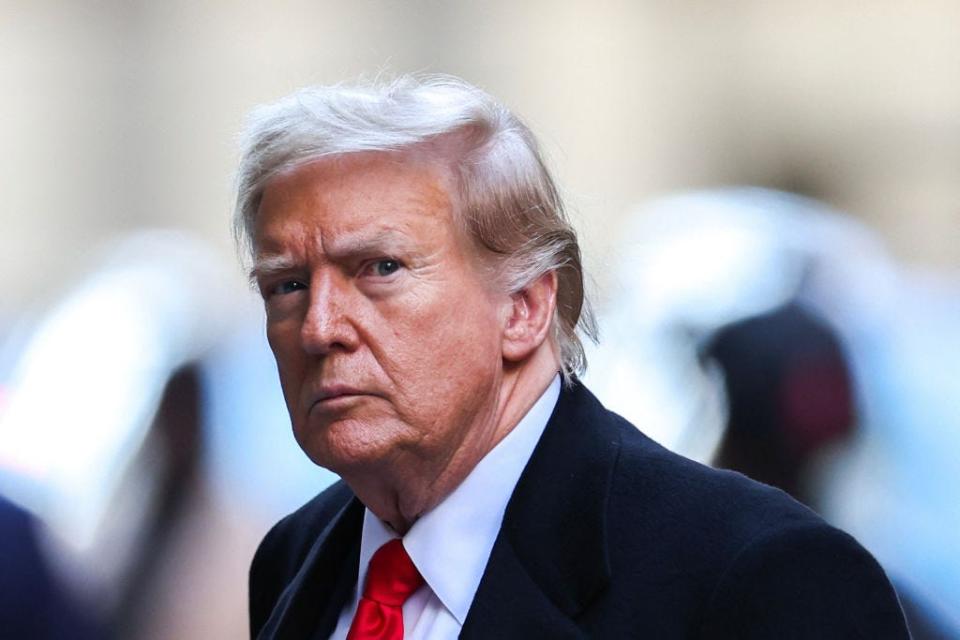Donald Trump loses presidential immunity delay effort for upcoming New York criminal trial
A New York judge on Wednesday rejected former President Donald's Trump's plea to delay his upcoming criminal trial until after the Supreme Court rules on his broad claim of presidential immunity.
Trump raised the argument in a March legal filing, urging Judge Juan Merchan to delay the trial until after the Supreme Court has ruled on the scope of presidential immunity in a separate Trump case dealing with federal election interference charges.
But Merchan said Trump raised the argument too late. The trial is scheduled to begin on April 15 and Trump was charged with falsifying business records by Manhattan District Attorney Alvin Bragg on April 4, 2023 − over a year before.
"This Court finds that Defendant had myriad opportunities to raise the claim of presidential immunity well before March 7, 2024," Merchan wrote in the Wednesday ruling.

That means Trump is on track to face his first criminal trial this month, even as he has so far been able to postpone or upend trial dates in other criminal cases.
Trump lawyer Todd Blanche and Bragg's office declined to comment.
In the federal election interference case, the Supreme Court agreed to consider to what extent former presidents are immune from criminal prosecution for acts during their presidency.
What is the case about?
The New York case centers on whether Trump criminally falsified business records in order to cover up a $130,000 hush money payment by Michael Cohen, Trump's former lawyer, to adult film actress Stormy Daniels before the 2016 presidential election. In exchange for the cash, Daniels agreed to stay quiet.
To prosecutors, the timing was no coincidence: they say Trump was concerned that Daniels would hurt his campaign by going public about a sexual encounter she says the two had. Trump denies her claims.
Trump then reimbursed Cohen through monthly checks that were disguised as payments for 2017 legal services and documented in the form of false business records at the Trump Organization, according to prosecutors.
New York law hikes the falsification crime up to a felony when the purpose of the disguise was to commit or conceal another crime. Prosecutors say that applies to Trump because he violated federal election laws dealing with campaign contribution limits. They've noted that Cohen served prison time after pleading guilty to making an illegal campaign contribution through the payment. They also say Trump was trying to violate New York election and tax laws.
Why delay until after Supreme Court ruling?
Trump argued that the Supreme Court's review of the scope of presidential immunity in his federal election interference case would reduce the risk of having to re-try the case because the New York court didn't apply the immunity doctrine properly. The Supreme Court has scheduled oral arguments for April 25, and has discretion over when to issue a decision after that.
But Merchan said Wednesday that Trump chose not to raise the presidential immunity defense until well past a 45-day period allotted under New York law for filing pre-trial motions after being arraigned, a process in which a defendant first appears in court and enters a plea. Trump was arraigned the same day he was charged: April 4, 2023.
Trump showed he was aware long ago that the presidential immunity defense was available to him, Merchan said. The judge noted Trump had fully briefed the issue in his separate federal election interference case by Oct. 5, and that he also discussed presidential immunity issues almost a year ago, when he tried to get the hush money case moved from state court to federal court on May 4.
"Further, and as an aside, the fact that the Defendant waited until a mere 17 days prior to the scheduled trial date of March 25, 2024, to file the motion, raises real questions about the sincerity and actual purpose of the motion," Merchan wrote. At the time Trump filed the motion, his trial was scheduled for March 25, although it has since been moved to April 15.
"The circumstances, viewed as a whole, test this Court's credulity," Merchan wrote.
Excluding evidence based on presidential immunity?
Trump separately called for excluding portions of evidence in the New York case based on the presidential immunity doctrine, such as social media posts about the payments to Cohen and Cohen's willingness to help prosecutors. He said in a court filing that his Twitter account was a main White House vehicle for conducting official business, rendering the posts protected official acts.
But Merchan said, given the timeliness issue, he wouldn't consider the merits of that argument.
In a footnote, Merchan added that Trump didn't appear to be arguing that the underlying alleged facts that support the charges in the hush money case — such as Cohen's payment to Daniels or record-keeping at the Trump Organization — raise a presidential immunity claim.
"Defendant's motion is DENIED in its entirety as untimely," Merchan said.
This article originally appeared on USA TODAY: Trump loses presidential immunity delay effort in NY hush money case

